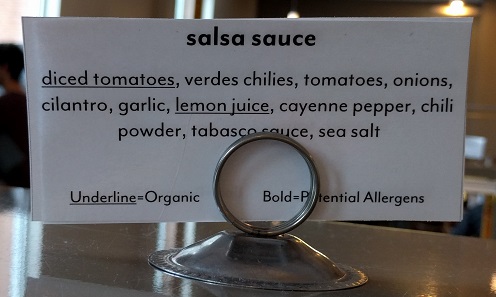I just took advantage of Fordham’s spring break to spend a few days at my favorite place, the Kripalu Center for Yoga & Health in Stockbridge, Massachusetts. Besides yoga, dancing, lifestyle classes, the whirlpool, and lots of reading and napping, I enjoyed some excellent food. However, Tuesday’s lunch buffet line contained a Bad Spanish gem:

Salsa, of course, means ‘sauce’, so that Salsa sauce means ‘sauce sauce’. This error reminds me of some usages I noticed when attending graduate school at Stanford University, where students swim in Lake Lagunita (‘lake lake’) and drive on The El Camino (‘the the road’).
The salsa, however, was delicious!
[An addendum: my son Aaron helpfully pointed out that the second ingredient, verdes chilies, is a remarkable combination of Bad Spanish and Bad English!]
“Salsa” means sauce in Spanish, but not in English. In English it’s the name of a type of sauce (of sorts). Thus I fail to see the incongruity or the error here. Same thing with the other examples. Same thing with “chili pepper”, for example. In Spanish “chili” means pepper, but in English it’s a type of pepper. Right?
John,
What an interesting comment! As someone who enjoys cooking, and who reads a lot of menus and cookbooks, I am convinced that “salsa” is normally used as a stand-alone word on the order of “pinot grigio” or “brie”. You wouldn’t say “pinot grigio wine” or “brie cheese”, would you? (“Brie cheese” sounds a little better to me than “pinot grigio wine”, but still extremely awkward.) For that matter you wouldn’t say “ketchup sauce” or “ragu sauce” either, just “ketchup” and “ragu”. And what about “apple fruit” and “carrot vegetable”?
I suspect that this vocabulary is a little eccentric. You can say either “pesto” or “pesto sauce”; likewise “bechamel (sauce)”, “hollandaise (sauce)”, “bolognese (sauce)”, and I’m sure many others. On the other hand, without the word “sauce”, “barbecue”, “apple”, and “cheese” all mean something different. And I agree with you that “chili pepper” is perfect English — however, note that “chile” in Spanish means “chili pepper”, not “pepper”.
I’m sure that someone has looked into this topic more systematically — it’s fascinating.
As always, thank you for reading and commenting.